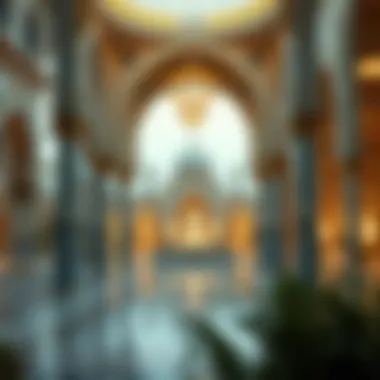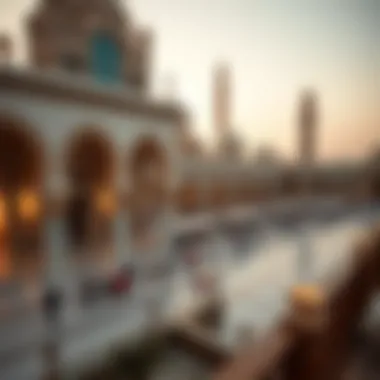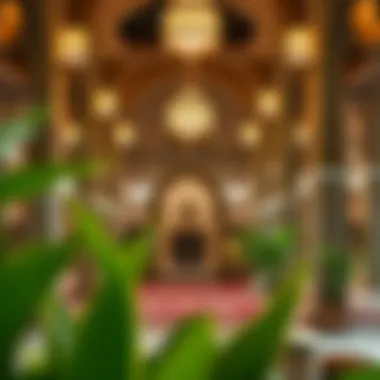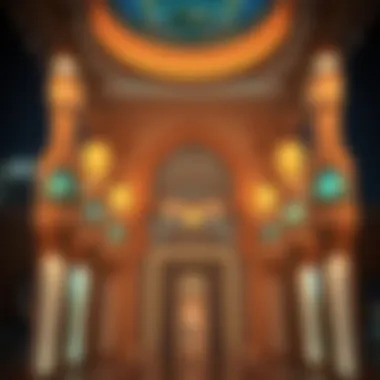Ramadan 2023 Dubai Timetable and Community Insights


Intro
Ramadan is more than just a month of fasting; it’s a time woven deeply into the cultural and spiritual fabric of Dubai. As the moon is sighted, millions of Muslims across the globe—especially in a bustling city like Dubai—prepare for a month that alters their daily rhythm. The experience goes beyond abstaining from food; it’s about reflection, community, and spiritual connection. In 2023, the timetable for Ramadan offers a comprehensive view into the timing of prayers, the process of fasting, and the traditions surrounding iftar that define this sacred month.
During Ramadan, residents and visitors alike engage in a variety of events that showcase the rich traditions of Emirati culture. Understanding the 2023 timetable not only assists attendees in planning their days but also provides an insight into the societal importance of the month. With this article, we delve into the timetable in a framework that emphasizes its relevance, helping everyone to navigate through this crucial time with ease.
"Ramadan is not just about fasting; it’s a reminder of empathy, compassion, and community – elements that bring everyone together in Dubai."
As we explore the fasting schedules, prayer times, and cultural implications in detail, you'll see how Ramadan shapes daily life in this dynamic city. The essence of this holy month transcends religious barriers, echoing sentiments of togetherness and generosity, inviting both locals and foreigners to partake in its warmth.
This guide aims to take you through the intricate workings of Ramadan in Dubai, ensuring that you're not only informed about the dates and times but also enriched by the experiences and traditions that make this month truly special.
Prelude to Ramadan
Ramadan stands as a pivotal time in the Islamic calendar, serving not only as a month for fasting but also a period of self-reflection, spirituality, and community engagement. It is essential to understand the importance of Ramadan, especially when examining the cultural context of a cosmopolitan city like Dubai. In this section, we’ll delve into the historical underpinnings that shape this revered month and its overarching significance within the Islamic faith.
Historical Context
To grasp the full essence of Ramadan, one must first explore its historical backdrop. Ramadan dates back to the early 7th century, closely associated with the life of the Prophet Muhammad. It was during this month that he is believed to have received the first revelations of the Quran, marking an extraordinary moment in Islamic history. The traditions surrounding Ramadan stem from these early days and have been shaped and enriched across the centuries.
The significance of Ramadan is intertwined with various historical events of the Islamic community, including the Battle of Badr—often referred to as the 'date of fate'—which occurred during this holy month in 624 CE. Such moments not only fuel the religious fervor associated with Ramadan but also highlight its role as an opportunity for spiritual improvement and communal solidarity.
Significance in Islam
Ramadan embodies far more than mere abstention from food and drink from dawn till sunset. This month is deeply woven into the fabric of Islamic practices, focusing on humility, devotion, and service to others. The five pillars of Islam serve as a guide for the Muslim community, with fasting being one of these critical tenets. By fasting during Ramadan, individuals experience hunger and thirst, fostering empathy for those who are less fortunate.
The act of patient fasting is a means of spiritual purification and a way to strengthen one's relationship with Allah. It is traditionally believed that during Ramadan, the gates of heaven open, while the gates of hell close, a reminder of the transient nature of worldly distractions. This idea encourages Muslims to engage in prayer, reflection, and community activities, making it a truly holistic experience. Further, the concept of Taqwa—a state of piety—is meant to be cultivated during this month, guiding individuals to lead lives infused with righteousness.
In essence, Ramadan serves as a profound period of transformation, enabling individuals to not only rejuvenate their spiritual lives but also to promote social welfare through acts of charity, known as Zakat. The collective experience of fasting fosters a strong sense of community, as families and friends gather to break their fast at Iftar, celebrated with festivities unique to different cultures.
"Ramadan is a celebration of sacrifice and devotion, a window into the heart of Islam, where every moment is imbued with purpose, connecting the individual to their faith and community."
Through exploring the historical context and the significance of Ramadan within Islam, one gains insight into why this month holds such profound importance, especially in a multicultural city like Dubai, where diverse communities unite in their observances.
Overview of Ramadan Dates
Understanding the Overview of Ramadan 2023 Dates is essential for appreciating the rhythm of life in Dubai during this significant month. Ramadan, a time of fasting, reflection, and community, brings about changes in daily schedules and activities that are vital for both residents and visitors. In Dubai, the expectation of the holy month creates an atmosphere filled with anticipation, as the dates dictate the flow of both commercial and personal interactions.
People prepare their lives around these dates, with implications reaching far into social practices and governmental operations. The dynamic between spirituality and everyday obligations becomes highlighted during this period.
Start and End Dates
In 2023, Ramadan is expected to begin on the evening of March 23 and will conclude on the evening of April 21, depending on the sighting of the moon. These dates, however, can vary slightly due to astronomical calculations and traditional moon sighting practices conducted in the UAE. The beginning of Ramadan marks the first day of fasting, or Sawm, where Muslims abstain from food and drink from dawn until sunset. It's not just about refraining from eating but also serves as a means for spiritual growth and self-discipline. The end of Ramadan will be celebrated with Eid al-Fitr, a festive holiday characterized by gatherings, meals, and charity.
The anticipation for these dates grows as many individuals engage in discussions about how this period will shape their lives in terms of worship, community involvement, and personal routines. Businesses adapt their operating hours, while families plan their daily schedules around Suhoor, the pre-dawn meal, and Iftar, the evening meal that breaks the fast.
Physical and Spiritual Preparation
Preparing for Ramadan involves both physical and spiritual elements that are important for a successful observance. In the weeks leading up to the holy month, many families begin to stock up on food items, particularly dates, fruits, and bulk essentials for Iftar meals. This preparation is not just logistical; it serves a deeper purpose tied to the essence of thawb—moving away from indulgence and redirecting focus toward modesty.
On a spiritual level, individuals often take time to reflect on their intentions. Many read the Qur'an more frequently, attend lectures, or participate in community events before Ramadan begins. Engaging with the teachings of Islam allows individuals to set a foundation for successful reflection and prayer throughout the month.
Moreover, it is common for people to evaluate their personal habits, considering how they can improve their lives during Ramadan. This aspect is especially vital in a fast-paced city like Dubai, where distractions are abundant, and the pace of life can sometimes sideline spirituality.
In summary, the Overview of Ramadan 2023 Dates ties closely into the fabric of Dubai's life during this holy month. From the specific start and end dates to the combinations of physical and spiritual preparations that take place, these elements converge to create a unique atmosphere, marked by introspection and communal connectivity. This understanding is imperative, offering insights into how Ramadan shapes both personal and professional realms within the emirate.


Dubai’s Fasting Timetable
Each year, the holy month of Ramadan sees a manifold shift in the daily rhythms of life in Dubai. For both residents and visitors, understanding Dubai’s Fasting Timetable is crucial. It's not just about when to eat or pray; it reflects the very essence of communal life, spirituality, and cultural practices. The timetable or schedule during this month serves as a roadmap, guiding individuals through the day while fostering unity and discipline within the community.
Suhoor and Iftar Timing
Suhoor, the pre-dawn meal, is taken at a specific time before the Fajr prayer, marking the beginning of the fasting period. Conversely, Iftar is the meal that breaks the fast at sunset, coinciding with the Maghrib prayer. In 2023, the timing for Suhoor and Iftar is particularly significant as it varies daily based on the position of the sun.
For example, on the first day of Ramadan, Suhoor might be around 4:30 AM, while Iftar could be at 6:45 PM. As the month progresses, the time for Suhoor will gradually shift later, while Iftar might come a bit earlier. Here's a quick reference for the first week of Ramadan:
- Day 1:
- Day 2:
- Day 3:
- Day 4:
- Suhoor: 4:22 AM
- Iftar: 6:48 PM
- Suhoor: 4:30 AM
- Iftar: 6:45 PM
- Suhoor: 4:27 AM
- Iftar: 6:46 PM
- Suhoor: 4:25 AM
- Iftar: 6:47 PM
and so on
Observing these times is not just about marking hours; it’s about spiritual engagement and maintaining a disciplined approach to fasting. Many people also use this time for prayer and reflection, making these moments deeply personal.
Daily Prayer Schedule
For those participating in Ramadan, daily prayers assume an added layer of importance. The five daily prayers (Salah) are pivotal to a Muslim's routine, but during Ramadan, the Taraweeh prayers, a special prayer performed at night, become crucial. This added prayer is a voluntary one, designed to bring together the community in worship after the Isha prayer.
Here’s a generalized outline of a typical daily prayer schedule during Ramadan:
- Fajr: before dawn (around 4:30 AM)
- Dhuhr: just after noon
- Asr: late afternoon
- Maghrib: immediately after sunset (around Iftar, approx. 6:45 PM)
- Isha: night (right after Maghrib)
- Taraweeh: performed after Isha
This schedule not only keeps individuals on track spiritually but also facilitates community bonding. Many mosques in Dubai, such as Al-Futtaim Mosque, host Taraweeh prayers that attract large gatherings, enriching the sense of community.
Embracing these prayer timings reinforces the essence of Ramadan, nurturing spiritual growth and a sense of belonging.
Understanding the flow of the day during Ramadan, dictated by the Fasting Timetable, allows individuals in Dubai to navigate the month with greater awareness. Adapting to a new rhythm may not be simple, but the rewards are manifold, turning mundane moments into cherished memories.
Cultural Practices During Ramadan
During Ramadan, cultural practices in Dubai blossom like a desert flower, and these traditions represent far more than mere rituals; they strengthen community bonds and exemplify the spirit of giving and gratitude. This section delves into two significant cultural aspects: community gatherings and the widely celebrated iftar buffets and events. These traditions serve to foster unity, enhance social connection, and deepen religious significance throughout the holy month.
Community Gatherings
Community gatherings during Ramadan are essential in Dubai, bringing together families and friends to share in the emotional and spiritual experience of the month. These gatherings often take place in homes, parks, and community centers, emphasizing the principles of hospitality and togetherness.
Many people decorate their homes with lanterns and lights, preparing for the influx of visitors and loved ones. It is common for families to set up larger tents in their backyards, where they can comfortably receive guests for iftar. A shared meal becomes not just about breaking the fast but also an opportunity to exchange stories, reflect on shared experiences, and indeed, strengthen relationships across generations.
Additionally, local mosques frequently host informal gatherings, which allow community members to bond over their unique traditions and practices. The sense of belonging created during these moments is significantly enriching as individuals reflect on their faith and showcase the eclectic, multicultural fabric of Dubai.
Iftar Buffets and Events
As the sun sets and the call to prayer echoes across the city, the vibrant culinary scene comes alive in Dubai. Iftar buffets and events attract locals and visitors alike, presenting a melting pot of flavors from various cultures. These buffets, held in upscale hotels and local eateries, cater to diverse palates by serving traditional Middle Eastern dishes alongside international fare.
Popular Venues
Some of the popular venues for iftar gatherings include the Burj Al Arab, Atlantis The Palm, and the Jumeirah Beach Hotel. Each venue offers unique ambiances and stunning views, contributing to the overall dining experience.
Burj Al Arab’s iftar not only reflects opulence but also showcases haute cuisine inspired by Arabic traditions, featuring dishes that are often meticulously crafted. Meanwhile, Atlantis The Palm caters to families seeking a blend of casual dining with stunning marine views. It’s remarkable how these venues offer meals that are visually captivating while satisfying both the palate and the soul.


Menu Highlights
The menu highlights during these iftar events reflect a rich tapestry of culinary heritage. Diners can expect to find fragrant biryanis, tender kebabs, and smooth, silky hummus. These culinary delights merge flavors from the Levant, North Africa, and even South Asia, providing diners a remarkable gastronomic adventure.
Moreover, many establishments are now moving towards healthier alternatives, introducing dishes that incorporate superfoods without sacrificing traditional flavors. The balance between traditional taste and modern dietary preferences open a door for inclusive dining experiences, accommodating everyone from meat lovers to vegetarians.
Community gatherings and iftar events represent more than just meals; they emerge as experiences that feed both the body and the spirit, renewing connections and fostering friendships during the blessed month of Ramadan. The intertwining of food, culture, and faith during this period inevitably contributes to making the Ramadan experience in Dubai truly unique.
Ramadan Traditions in Dubai
Ramadan, a month recognized for its profound spiritual significance, thrives with rich traditions in Dubai. These customs straddle the line between the sacred and the communal, offering an insight into the cultural fabric of this vibrant city. The traditions are not merely about fasting; rather, they encompass heartfelt experiences that foster unity, generosity, and reflection.
Charity and Giving
One of the cornerstones of Ramadan traditions in Dubai is charity. During this holy month, the act of giving is elevated, pushing individuals to become more philanthropic. The Quran emphasizes the importance of Zakat, which is a form of almsgiving, and many residents eagerly participate, ensuring that those less fortunate can partake in the spiritual journey of Ramadan.
- Different forms of charity:
- Zakat: Mandatory almsgiving, usually calculated based on savings and assets.
- Sadaqah: Voluntary charity that can be given at any time.
- Food donations: Many organizations and mosques organize food drives to provide Iftar meals to those in need.
The practice of giving transcends personal wealth; it establishes a community ethos, where everyone - from wealthy business leaders to ordinary residents - becomes a part of a collective effort to support the less fortunate.
As the sun sets each evening, the collective spirit of giving shines through, with many restaurants and cafes opening their doors to host Iftar meals for those unable to afford one. For example, establishments in the heart of the city, like Al Fanar Restaurant, often set up community tables where everyone is welcome, regardless of faith or background, to break their fast together in a show of solidarity.
Family and Community Bonds
Family gatherings and camaraderie play a pivotal role during Ramadan in Dubai. As observed by many, the simple act of sharing a meal becomes a profound means of expressing love and togetherness. Families often come together for Suhoor and Iftar, strengthening bonds that might sometimes fray during the hustle of daily life. This month inspires individuals to put aside differences and embrace a sense of belonging.
Traditionally, the evening Iftar meal is a lavish affair, often featuring a spread of dates, water, and a variety of dishes that cater to both local and international palates. Here are some typical foods one might find at an Iftar gathering:
- Dates: A customary food, packed with nutrients and energy.
- Luqaimat: Sweet dumplings drizzled with date syrup or honey.
- Harees: A comforting dish made of wheat and meat, often enjoyed during large family gatherings.
Community events take on unique forms during Ramadan, such as charity galas, shared prayer gatherings, and cultural exhibitions. Each activity becomes an opportunity to connect with others and engage in discussions about faith, tradition, and community aspirations. Crowds flock to mosques not only for prayer but also to create bonds – greeting neighbors and friends, further intertwining the fabric of society.
"Ramadan transcends personal worship - it's a community affair that embraces both the individual and collective spirit."
In summary, Ramadan traditions in Dubai, steeped in concepts of charity and family unity, manifest in numerous acts that enrich both personal and community ties. They help weave a tapestry of compassion, reminding everyone of the essential values of generosity and togetherness.
Adapting to Life During Ramadan
Adapting to life during Ramadan is imperative for both residents and visitors in Dubai. This holy month brings a wave of transformation, influencing daily routines, work schedules, and even the atmosphere in public spaces. It is not just about fasting from dawn to dusk; it encompasses a spectrum of societal changes that impact interpersonal relationships, productivity, and community engagement.
Fasting is a practice that requires not just a shift in eating habits but also a mental adjustment to embrace the spiritual essence of Ramadan. For many, this month is a time of reflection, increased devotion, and connection with family and the wider community. The importance of adaptation extends to various aspects of life, which will be analyzed further.
Workplace Adjustments
One of the most noticeable changes during Ramadan is the workplace dynamic. Employers often recognize the unique challenges faced by their employees during this time. Therefore, many businesses adjust their working hours. In Dubai, it’s common for workdays to shorten, allowing employees more time to prepare for iftar. For instance, an eight-hour workday may be condensed into six hours, typically shifting to start later in the morning.
The expectation is not merely to modify schedules but to foster a supportive environment. Here are some gestures companies often adopt to ease the transition:
- Flexible Hours: Allowing employees to come in later accommodates those who are fasting, preventing fatigue and promoting productivity.
- Prayer Rooms: Organizations may allocate spaces for daily prayers, emphasizing the significance of spiritual observance during this month.
- Nurturing Atmosphere: Social events and morale-boosting activities around iftar provide employees a chance to connect and unwind, which can relieve some of the daily stress.
These adjustments reflect an understanding of the deeper context of Ramadan, ensuring employees feel valued and respected.
Public Services and Facilities
Dubai’s public services adapt as well during Ramadan, enhancing the comfort of its residents and visitors. Local authorities proactively adjust their operations to accommodate fasting hours. For example, many public facilities like schools and government offices modify their timing.


- School Hours: Educational institutions often begin classes later in the day, recognizing that students may need additional rest or time for prayers.
- Health Services: Clinics and hospitals may have reduced hours but ensure that emergency services remain fully operational. Special attention is given to the health needs during this period, including nutritional counseling for those fasting.
- Public Transport: The public transportation systems tend to extend operational hours, allowing flexible travel for iftar gatherings and prayers in the evening.
"Understanding how daily life shifts illustrates the essence of community and respect that Ramadan signifies in Dubai."
In nurturing an environment that respects the practices of the holy month, Dubai exemplifies a harmonious blend of culture and modern lifestyle. Whether it’s the pacing of daily life or the small adjustments in public services, adapting to Ramadan transforms Dubai into a spiritual hub where tradition meets contemporary living.
Recognizing the importance of these adaptations can enhance not just personal experiences but also communal life during this sacred time.
Religious Observances
Religious observances during Ramadan represent a cornerstone of spiritual life for millions of Muslims globally, particularly in a cosmopolitan hub like Dubai. The importance of this section stems from the ways in which these practices cultivate a sense of community, reinforce faith, and foster solidarity among individuals. Ramadan is not merely a month of fasting; it is also a time for prayer, reflection, and connection with the divine. The atmosphere of devotion and reverence is palpable, making it crucial to understand how various elements come together to enhance this sacred month.
Taraweeh Prayers
Taraweeh prayers are a specific type of prayer conducted during the nights of Ramadan. These prayers hold a profound place within the month’s religious practices as they serve both as a means of worship and a communal gathering. Typically performed in pairs, these prayers allow individuals to recite longer passages from the Quran, fostering a deeper understanding of its teachings.
When taken in the company of others, the experience enhances the spiritual bond within the community. It’s not uncommon to see entire families and groups of friends heading to local mosques after iftar to partake in this special prayer together. A variety of mosques across Dubai create immersive experiences for worshippers, turning prayer into a collective celebration of faith.
It’s important to note that while attending Taraweeh is recommended, it is not obligatory, allowing families and individuals the flexibility to balance their personal schedules with religious commitments. As such, participation varies, but many take advantage of this special month to engage as much as possible.
Eid al-Fitr Preparation
As Ramadan crescendos toward completion, the preparations for Eid al-Fitr take center stage. This festival marks the end of fasting, and its arrival is awaited with excitement. Much like a child on Christmas morning, everyone feels the buzz, with plans for family gatherings, special meals, and gift exchanges beginning well in advance.
Eid al-Fitr serves as both a spiritual milestone and a social event, where individuals express gratitude for the strength shown during Ramadan, and they foster a culture of giving. As Dubai is known for its diversity, preparations might involve various customs, blending traditional Emirati practices with those from the home countries of its residents.
A few key elements of Eid preparation include:
- Zakat al-Fitr: This form of charity is important to ensure that those in need can partake in the festivities, emphasizing the communal aspect of the occasion.
- Special Meals: Families often prepare traditional dishes that vary by community, from Emirati specialties to Asian or Middle Eastern treats, making the celebration a flavorful experience.
- Attire and Gifts: People often invest in new clothes to symbolize renewal and freshness in spirit. Gifting also plays a role in strengthening community bonds, as it reflects a mutual celebration of joy.
The essence of Eid is more than just feasting; it encapsulates the spirit of gratitude, forgiveness, and togetherness that defines the core of Ramadan.
Health Considerations During Fasting
The holy month of Ramadan is not just a time for spiritual reflection but also a period that challenges one's physical health. When engaging in fasting from dawn until dusk, individuals might overlook health aspects that are quite essential for maintaining vitality and well-being. This section aims to delve into two pivotal areas: dietary guidelines and hydration management. Proper attention to these factors can make the fasting experience not only spiritually fulfilling but also beneficial in terms of health.
Dietary Guidelines
During Ramadan, the meals consumed during Suhoor and Iftar are critically important. It's during these times that nourishment is replenished, thus influencing energy levels throughout the day. Here are several key dietary guidelines to keep in mind:
- Balanced Meals: It's vital to include a mix of proteins, carbs, and healthy fats. Foods like whole grains, lean meats, fruits, vegetables, and healthy oils should be prioritized. These help in sustaining energy and avoiding fatigue.
- Avoid Processed Foods: While it might be tempting to indulge in fast food during Iftar, these foods often lack nutritional value and can lead to spikes in blood sugar levels, followed by extreme fatigue.
- Portion Control: It can be all too easy to overeat after a long day of fasting. Instead, it’s advisable to start with a few dates and water – this not only helps to hydrate but also prepares the stomach for meals. Gradually introducing more food will aid digestion.
- Prioritize Fiber: Incorporating fibrous foods like oats and fruits can promote a feeling of fullness and help regulate blood sugar levels, which is particularly helpful during long hours of fast.
- Plan Ahead: Preparing meals in advance can relieve stress and ensure that nutritious options are readily available. A well-thought-out Suhoor can set the tone for a better fasting day.
Managing Hydration
Staying hydrated during Ramadan is possibly one of the toughest challenges, especially in a city like Dubai where the temperatures can soar. Here are some practical hydration strategies:
- Drink Plenty of Water: Individuals should aim to consume at least 8 glasses of water between Iftar and Suhoor. Staying well-hydrated can mitigate feelings of thirst during the fasting hours.
- Choose Hydrating Foods: Foods with high water content, such as cucumbers, watermelon, and soups, should be part of meals. These can offer hydration along with nutrients.
- Limit Caffeine: Caffeinated drinks can act as diuretics, leading to increased urination and ultimately dehydration. Reducing or eliminating coffee and tea during non-fasting hours can help retain fluids.
- Moderate Salty Foods: Salty foods may increase thirst during fasting hours. Staying mindful and limiting such intake can be beneficial.
- Avoid Sugary Drinks: While they may seem refreshing after a day of fasting, sugary drinks can lead to rapid dehydration and energy crashes.
Finale
In summarizing the observance of Ramadan in Dubai, it’s evident that this month transcends mere fasting; it's a time for reflection, growth, and community bonding. The framework laid out in this article covering the fasting timetable and cultural practices is essential not just for understanding the rituals, but also for appreciating their profound impact on diverse communities in Dubai.
During Ramadan, life in this vibrant city undergoes a notable shift. The nights come alive with shared meals at iftar, echoing with laughter and community spirit. For investors and business professionals, acknowledging these shifts can enhance engagement strategies and foster better relationships with local clients, aiding market sensitivity and cultural awareness.
Reflections on Ramadan’s Impact
The impact of Ramadan manifests in various layers:
- Enhancement of Community Ties: The act of fasting encourages unity, as people come together to break fast and engage in nightly prayers. This common goal of spirituality acts as a glue binding families and communities closer.
- Economic Dynamics: Businesses in Dubai prepare for Ramadan by adjusting hours and offering special promotions during iftar. This creates a bustling atmosphere in markets and restaurants, showing the economic significance of the month.
- Spiritual and Personal Growth: Many individuals use this time to recalibrate their priorities, focusing on charity and self-improvement. This can lead to a positive ripple effect on personal relationships and societal attitudes.
Overall, understanding Ramadan provides valuable insights into the fabric of Dubai's society. This knowledge is particularly beneficial for expatriates and foreign investors navigating the local landscape, as being respectful and aware of these cultural observances can enhance mutual respect and business success.
In essence, Ramadan is not only a time for personal reflection; it also shapes community interactions and economic activities, making it a noteworthy aspect of life in Dubai. By recognizing the significance of this holy month, we can appreciate its role in the social tapestry of one of the world's most eclectic cities.











